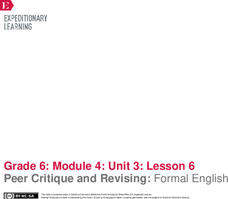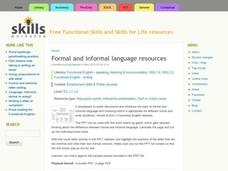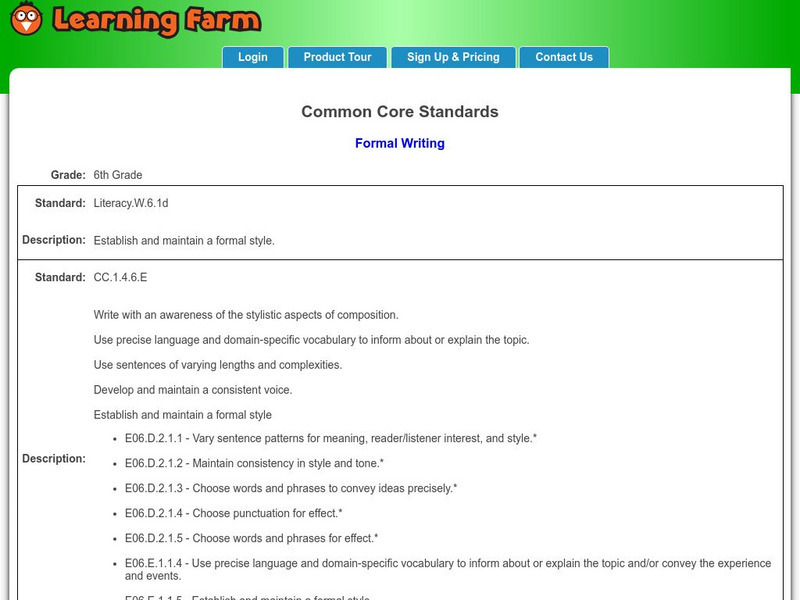ReadWriteThink
Style-Shifting: Examining and Using Formal and Informal Language Styles
Your high schoolers are probably versed in two languages: formal language, and informal conversation. Help them identify the correct language style for their audience and context with a thorough lesson and examples of different speech...
EngageNY
Peer Critique and Revising: Formal English
Dear Sir or Madam: What's the difference between formal and informal language? Scholars focus on using formal English and transitions in their position papers. After revising their rough drafts, they engage in the peer editing process...
EngageNY
End of Unit Assessment: Presentation of Position
What is the difference between formal and informal language? Pupils rewrite their position speeches to adapt them for an audience of adults. Next, they present their speeches in small groups, attempting to answer the question, "Which...
EngageNY
Grade 10 ELA Module 3: Unit 3, Lesson 8
All is fair in claims and counterclaims. Scholars continue to work on their argumentative writing pieces by ensuring their papers fairly address claims and counterclaims. Writers review the importance of argumentative writing conventions...
Portland Public Schools
Teaching Tone to Teenagers
Tone is a tough topic to teach to teenagers. But never, fear, help is here in the form of a unit plan that takes advantage of their interest in music to set the stage for a series of activities that lead them to understand how setting,...
One Stop English
A Lesson on Register
The classroom might not be the best place for informal language, but it's a great place to teach middle and high schoolers how to identify the correct language register for their audience. A short lesson on formal and informal language...
EngageNY
Summarizing Complex Ideas: Comparing the Original UDHR and the "Plain Language" Version
The eighth lesson plan in this series continues the focus on vocabulary and increasing young readers' awareness of academic language. Pairs of learners participate in a short vocabulary review activity called Interactive Words in which...
Curated OER
Understanding the Poem
Practice literary analysis with your poetry pupils using the mysterious narrative poem "The Listeners." They examine the archaic language and answer 12 comprehension and analysis prompts. Foster creativity with these referential...
Curated OER
Formal and Informal Language Resources
Yo! Check it out. Here's a lesson on formal and informal language. And the packet includes a game. What fun!
Curated OER
Diction: Formal and Informal Language
Coke or Pepsi? Is it the taste or the advertising that determines preference? As part of a study of diction, class members examine two passages, one formal and one informal, about Coca-Cola and Pepsi. In addition, they consider word...
Curated OER
Formal and Informal Language
Words carry connotative baggage and some suitcases are bigger than others. Learners consult the Chambers School Dictionary to identify the formal, informal or slang words used in a series of exercises.
Curated OER
Letter Writing - Formal
Although rarely used these days, letter writing is still a form of writing reviewed in schools. After examining written letters, middle schoolers discuss characteristics of a formal letter and its parts. They choose a famous person to...
Beacon Learning Center
Beacon Lesson Plan Library: Formal or Informal?
Start talking trash with your elementary English class! Then lead a discussion comparing formal and informal language. Divide the class into groups to answer a questionnaire and analyze a set of sentence cards to analyze. This is a cool...
TES Global
Tes: Romeo and Juliet: Prologue Introduction Resource
[Free Registration/Login Required] This downloadable activity is designed for the Prologue to William Shakespeare's Romeo and Juliet. Students will match quotes from the Prologue to sentences that are less formal. Students will also...
Better Lesson
Better Lesson: Audience, Tone, and Style in Informative Text
Students will read samples of informative writing and highlight examples of how tone and style are used by the authors. Students will then apply this knowledge by writing their own informative text. Multiple examples of student work and...
CPALMS
Cpalms: The Lesson Formerly Known as "Wassssuuup"
[Free Registration/Login Required] For this lesson, students are actively engaged in learning how formal and informal language are used in written and oral communications. Downloadable handouts are provided.
University of Michigan
University of Michigan: How to Give an Academic Talk [Pdf]
The Awful Academic Talk and the Principles of Effective Talks are discussed and outlined with suggestions for a more interesting speech delivery. This was originally directed to those making academic presentations at a university or...
Online Writing Lab at Purdue University
Purdue University Owl: Academic Writing: Levels of Formality
Basic information explaining how the context, i.e., the audience and your purpose, determines whether you should use formal, semi-formal, or informal language. The links on the sidebar provide much more information about formal academic...
Other
Pitner's Potpourri: Formal and Informal Language
A Common Core teacher resource provides an approach to educating students on the differences between formal and informal language.
Other
Match the Memory: Formal vs Informal Language
Match the Memory Interactive game where players match a word to either formal or informal language.
Learning Farm
Learning Farm: Common Core Standards: Formal Writing
Writing formally means writing using words that are precise, objective, and impersonal. This lesson gives examples of formal language and also provides games and a test. CCSS.ELA-Literacy.WHST.6-8.2.e
Online Writing Lab at Purdue University
Purdue University Owl: Using Appropriate Language
Knowing the right language for your particular audience is a necessary skill for all writers. No one wants to offend their audience or appear as though they don't know their content. Learn these rules of thumb to become more familiar...
ReadWriteThink
Read Write Think: Lesson Plan: Audience, Purpose, Language in Electronic Messages
Lesson plan considers changes in writing style since the inception of e-mail and text messaging.
Sophia Learning
Sophia: Grammar and Formality
This lesson goes over ways in which the correct use of grammar may be perceived as formality. CCSS.ELA-Literacy.CCRA.L.1 and CCSS.ELA-Literacy.CCRA.SL.6, L.11-12.1a Gram/Usage changes


















![University of Michigan: How to Give an Academic Talk [Pdf] Article University of Michigan: How to Give an Academic Talk [Pdf] Article](https://content.lessonplanet.com/knovation/original/32627-6d6b5738d829f3ae323a2287b87a2e0b.jpg?1661500277)






